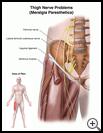
Thigh Nerve Problem
________________________________________________________________________
KEY POINTS
- A thigh nerve problem is numbness or pain in your outer thigh.
- Treatment depends on the cause of your symptoms. Treatment may include medicine, surgery, or treatment of diabetes or disk problems in your back that affect your nerves.
________________________________________________________________________
What is a thigh nerve problem?
A thigh nerve problem is numbness or pain in your outer thigh.
What is the cause?
The nerve in your upper outer thigh starts in your low back and passes over the front of your hip bone before it goes into your thigh. This nerve can get trapped or be damaged by pressure from:
- Injury to the hip, back, or leg, such as falling on your hip, or a low back injury that causes a disk to push on the nerve
- Being overweight
- Wearing tight clothing or belts
People who have diseases that affect the nerves, such as diabetes, may be at higher risk for getting a thigh nerve problem.
What are the symptoms?
Symptoms can include burning, tingling, numbness, or pain in the upper, outer thigh. Your skin may be very sensitive if anything touches it. The symptoms may last for weeks to months.
How is it diagnosed?
Your healthcare provider will ask about your symptoms and medical history and examine you. Tests may include:
- X-rays
- Blood tests
- CT scan, which uses X-rays and a computer to show detailed pictures of the leg
- MRI, which uses a strong magnetic field and radio waves to show detailed pictures of the muscles and nerves
- Nerve conduction studies, which use small wires that are taped to your skin to send mild electric signals and check how well your nerves work to carry signals to your muscles
How is it treated?
Treatment depends on the cause of your symptoms.
- To treat pain, your provider may prescribe medicine to treat nerve pain, or give you shots of medicine around the nerve to block pain or decrease inflammation. Your provider may tell you to take nonprescription pain medicine, such as acetaminophen, ibuprofen, or naproxen. Read the label and take as directed. Unless recommended by your healthcare provider, you should not take these medicines for more than 10 days.
- Nonsteroidal anti-inflammatory medicines (NSAIDs), such as ibuprofen, naproxen, and aspirin, may cause stomach bleeding and other problems. These risks increase with age.
- Acetaminophen may cause liver damage or other problems. Unless recommended by your provider, don't take more than 3000 milligrams (mg) in 24 hours. To make sure you don’t take too much, check other medicines you take to see if they also contain acetaminophen. Ask your provider if you need to avoid drinking alcohol while taking this medicine.
- Physical therapy may be prescribed to help you stretch, relax, and strengthen the painful area. The therapist may also use ultrasound to help reduce the pain. A TENS unit, which relieves pain by sending small electrical impulses to your nerves through patches put on your skin. The electrical impulses block pain.
- You may need surgery to release a trapped nerve.
- If the problem is due to a health problem such as diabetes, or a disk problem in your back, treating the problem may also help with thigh nerve problems.
How can I take care of myself?
Follow the full course of treatment prescribed by your healthcare provider. In addition:
- Wear looser clothing and belts.
- Keep a healthy weight. Lose weight if you are overweight.
Ask your provider:
- How and when you will get your test results
- How long it will take to recover
- If there are activities you should avoid and when you can return to your normal activities
- How to take care of yourself at home
- What symptoms or problems you should watch for and what to do if you have them
Make sure you know when you should come back for a checkup. Keep all appointments for provider visits or tests.

